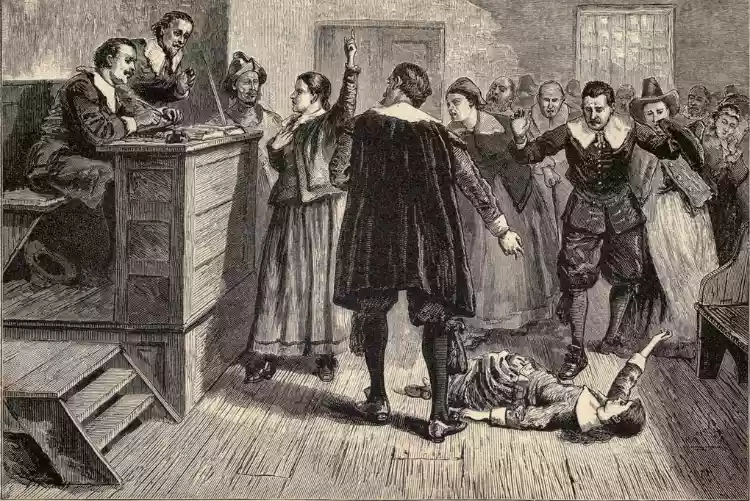Table of Contents
Wicca is an ancient yet ever-evolving spiritual practice that seeks to bridge the gap between humanity and the divine. It is a unique and powerful system of beliefs that focuses on honoring nature, developing personal autonomy, and living ethically. This article will explore what it means to be a Wiccan, from rituals and spells to ethics and morality. In doing so, we can gain some insight into this increasingly popular way of life – one which seeks to bring us closer together as individuals and with our sacred environment.
Wicca is a modern-day earth-based spirituality with traditions rooted in ancient pre-Christian beliefs. Wiccans share many common beliefs, including that of living in balance and harmony with nature and reverence for the divine feminine energy.
Wiccans also practice magic, using charms, spells, and rituals to attract positive energy into their lives. Although there are many different types of ritual practices within Wicca, they all share the same foundation of honoring sacred cycles of life and using rituals to invoke the power of the natural world. Wiccans also believe in karma–that what we put out into the world will come back to us threefold.
What is Wicca?
While Wicca is not the oldest religion, it certainly has been inspired by ancient pagan practices and hermetic teachings. With rituals and spellwork, this religious movement has its beginnings in the 1950s and has grown substantially over the last few decades. With no main authority or leader, Wicca has been a practice of many interpretations and unique groups, though with some similar practices.
Where does Wicca come from?
Though this is hotly debated in Wiccan circles and Witchcraft, Wicca is said to have been started by Gerald Gardner, a retired British civil servant. He outlined a series of rituals and practices that others could perform to celebrate holidays, rites of passage, and other turning points in the year. Along with Doreen Valiente, they developed a core structure for Wicca, one that is still followed to this day.
The beliefs of Wicca
The main beliefs and tenets of Wicca include the following:
Duotheistic
In the practice of Wicca, there is often a male God and a female Goddess who are worshipped. They are often referred to as the Lord and Lady or as the Horned God and the Triple Goddess. And others refer to them as the Great Goddess and the Great Horned God.
Moon cycle rituals
As Wiccans, these practitioners will celebrate the moon phases, esbats, or the times when the moon changes its phase. This includes the full moon and the new moon, as well as the waning and waxing cycles of the moon. In doing so, one can tap into the energy of change, growing and shrinking light.
Wheel of the year rituals
In addition, there are eight sabbats, or holidays, each year. They are in relation to the changes in the seasons and the growing cycles. They include:
- Imbolc (around February 1)
- Spring Equinox/Ostara (around March 21)
- Beltane (around May 1)
- Summer Solstice/Litha (around June 21)
- Lammas/Lughnasadh (around August 1)
- Fall Equinox/Mabon (around September 21)
- Samhain (October 31)
- Winter Solstice/Yule (around December 21).
These dates are for the Northern Hemisphere, as those in the Southern Hemisphere would celebrate opposing holidays due to the sun’s travels across the sky.
Wiccan Rede
There is also a core belief of ‘An it harm none, do what thou will.’ In this belief, which not all Wiccans ascribe to, you can do as you want so long as it does not harm others. The Wiccan Rede is meant to create a standard of morality and integrity within the community. Magic and spell work – Some Wiccans will practice magic and spell work, but this is not the case for all Wiccans.
Though these are the main and most common practices, there are many others that are used in certain Wicca groups and covens.
The History of Wicca

Wicca is an earth-based religion that dates back hundreds of years. The modern practice of Wicca is believed to have originated in the mid-20th century, during a time when popular culture was becoming increasingly exposed to the occult and paganism. Prior to this, witches were persecuted for centuries in Europe and North America during what is known as the “witch hunts”. During these times, anyone who practiced witchcraft or other forms of alternative spirituality was at risk of being labeled a heretic, tortured, and even executed. Despite cases of persecution throughout history, there have been many documented instances where individuals and groups practiced their own version of Wicca covertly or in secret with no repercussions from the greater society. As such, it can be said that Wicca has existed since ancient times. While its current iteration is vastly different from its past due to various cultural influences, the core principles remain largely intact: honoring nature spirits and deities; engaging in magical practices; cultivating personal autonomy; creating positive change within oneself first before attempting to fight systemic oppression externally; practicing hospitality while also using discernment.
As in most histories, there are differing accounts of where Wicca began. Some say that it began in the 1950s with the writings of Gerald Gardner. Others say that it began much earlier than that but that Wicca only became a more organized set of practices with Gardner and Valiente’s writings. No matter what is correct, one thing is clear, Wicca and similar practices have been in society for some time – and their popularity is growing.
The Witch Hunts
During the sixteenth and seventeenth centuries, there were numerous witch hunts across Europe and the United States (then the American colonies). Women were jailed, tortured, and killed because they were accused of being witches. While there is little evidence to support the accusations, many have stated that 100,000 people were killed in the hunts – perhaps even more since recordkeeping may not have been accurate.
And there are those who believe that Christianity co-opted witchcraft, stealing its traditions and calling them evil. Plus, there are those who believe that all the historical ‘facts’ about Wicca are untrue and that scholars have proven that other creation stories exist.
Gerald Gardner – the man and the mystery
Gerald Gardner is known as the “Father of Wicca” and is credited for the development of the modern-day Pagan religion. Gardner was a British civil servant and an amateur anthropologist who had a great interest in folklore and mythology. In 1939, he published his first book on Witchcraft called “Witchcraft Today“. This book brought attention to Gardner’s ideas of witchcraft, which he wrote were rooted in traditional European beliefs, such as Druidry and other ancient forms of religion.
Gardner’s writings discuss rituals, magical techniques, beliefs, and practices that formed the basis of what is now known as Traditional Wicca or British Traditional Wicca (BTW). Gardner continued to develop his own version of Witchcraft through initiation rituals and private teachings that incorporated elements from other occult traditions such as Hermeticism, Ceremonial Magic and Freemasonry. He founded covens around England that practiced his form of Wicca, which became the dominant form in England during the 1950s and 1960s. During this time period, Gardnerian Wicca spread to North America, where it has become one of the most popular forms of paganism today.
What are the Core Principles of Wicca?
At its core, Wicca is a nature-based spiritual path that honors and celebrates the cycle of life and death. Wiccans view themselves as part of an extended family — all living things in the Universe — and believe in personal responsibility to live in harmony with Nature and all other beings. Wiccans also strive to develop their personal power through self-awareness, discipline, and dedication to their craft.
- Belief in the divine and reverence for the natural world.
- Personal autonomy and ethical living are characterized by respect for all things.
- Connection to the cycles of life and death.
- Inner exploration through rituals, spells, and symbolic systems such as tarot readings.
- Harmony between humans, nature, and the spiritual realm.
- Acknowledging and accepting the duality of life and the power of both good and evil.
- Adopting a life philosophy focused on intentionality and personal responsibility.
- Unification with all life through loving relationships with oneself, others, and all things.
- Honoring the cycles of nature, such as the moon phases, seasons, and solar holidays.
- Cultivating a relationship with one or more deities in order to guide a personal spiritual journey.
- Engaging in magickal practice that can be used for healing, self-expression, and manifestation of desired realities.
- Living in accordance with the Wiccan Rede: “An it harm none do what thou wilt”.
- Promoting justice within and outside of themselves by creating positive change in their own lives first before attempting to fight systemic oppression externally.
- Embracing an ever-evolving personal truth that is based upon experiential learning rather than dogmatic beliefs.
- Practicing hospitality through openness towards different opinions and cultures while also using discernment to protect against manipulative people or situations.
What’s the primary focus of Wicca?
The primary focus of Wicca is on developing relationships with natural forces such as gods, goddesses, spirits, plants, and animals, as well as connecting with the rhythms of the seasons. Wiccans practice various forms of divination, such as Tarot readings, dream interpretation, and crystal healing. They also use various methods of magic, including spell casting, herbalism, and astrology, for healing purposes and protection from negative energies or ill intentions.
Working as a Solitary witch or joining a Coven?
Working as a solitary witch or joining a coven is a personal decision, depending on where you are in your spiritual practice and what is right for you. For those just beginning Wicca, working as a solitary witch can provide the freedom to explore and learn at your own pace without having to abide by structure or rules. Working alone also offers more flexibility in terms of scheduling spells, rituals, and readings.
On the other hand, joining a coven can be beneficial for more experienced Wiccans. Covens generally offer support from like-minded individuals who share the same principles, making it easier to practice rituals and spells together. In addition, having a mentor or teacher within the group may help strengthen the understanding of concepts and provide guidance when needed. Ultimately, deciding to work as a solitary witch or join a coven will depend on your preferences and level of experience with Wicca.
Magic and Wicca

Many Wicca practitioners believe in magic and make it a part of their daily practice. This might take place in the middle of a sacred circle in which energies are called in to help with the workings. In addition, the magic might be used to create change in the ritual participants themselves or in the greater world. Aleister Crowley, a ceremonial magician, once stated that ‘the science and art of causing change to occur in conformity with will’ was the definition of magic. And this is something many still agree with today.
In Wiccan practice, it is believed that certain rituals and spells can produce desired outcomes by focusing energy on common wishes and intentions. Kindness, respect, and reciprocity are core values within the religion, and these principles are integrated into magical practice as well.
Magic is used for many things in Wicca, such as healing, protection, connecting with the divine, divination, transformation of self or others, fulfilling wishes, cultivating abundance or wealth, and even journeying to unseen realms. Within its scope of beliefs and practices, there are many types of magical work that can be done to create change in one’s life or the lives of others. With proper understanding and guidance on the ethical use of magic, any individual may be able to explore this fascinating aspect of Wiccan practice.
No matter what a Wicca practitioner does in their personal practice or with a group, this is a religious system that believes in deities and spirits and in using magic to create change. With the purest of intentions (‘in perfect love and in perfect trust’ according to some), Wicca uses magic to bring balance to the world.
Wiccan Spells and Spell Casting
Wiccan Spell Casting is an important part of the Wiccan Tradition. It involves rituals and magical acts which are used to help manifest desired intentions and bring positive change into the world. By understanding and practicing the use of intention, visualization, symbols, herbs, and other tools within a Wiccan context, practitioners can become more aligned with the power of nature and develop their own spiritual practices.
When preparing for spell casting, it is important to create a space that feels sacred in order to maintain focus on one’s intentions. This can be done by smudging with incense or herbs to clear negative energies from the area and setting up an altar or sacred circle that is adorned with items meaningful to each individual practitioner. Along with creating a sacred space, it is also important to gather any supplies that are necessary for one’s particular type of spell, such as candles, crystals, figures, and/or amulets with appropriate symbols or charms.
Once all preparations have been taken care of, then it may be time to cast a spell! Rituals and chants used in spell casting typically involve speaking one’s intentions aloud while visualizing them and directing energy toward bringing them into reality. Keeping track of what energy has been used within the ritual is essential so that proper protocols can be followed when unwinding and releasing it afterward, along with grounding oneself back into their body and environment. As long as these steps are taken, then powerful magic can take place within a Wiccan context resulting in beneficial changes both internally and externally along life’s path.
Wiccan Code of Conduct for Casting Spells
The Wiccan Code of Conduct for Casting Spells is a set of ethical and legal guidelines that are used to ensure practitioners maintain a set of standards when casting spells. These standards include being honest and transparent about one’s intentions, never using magic to harm or manipulate another, and practicing moderation when dealing with potentially dangerous magical acts. Additionally, always taking precautions to protect oneself from any negative effects caused by casting spells is also an important principle within this code. Lastly, being respectful of the natural world and creatures that exist within it as well as other practitioners, is equally essential in sharing the teachings of this craft responsibly. All these principles combine together to form an essential code for maintaining a healthy relationship with Wiccan magick.
Wiccan Love Spells
Love spells are a popular form of magic used in Wicca and other forms of Paganism. In its most basic form, a love spell is used to attract someone to you. These spells can be simple chants, burning herbs, physical talismans, or complicated rituals. Different cultures have their own version of love spells, but all share the same intention: to bring love into your life and deepen existing relationships.
A successful love spell requires patience and practice. It’s important to ensure that you keep your intentions clear and honest throughout the process. Dabbling in dark forces like hexing and curses should not be done without caution, as they can become dangerous and have unexpected consequences. Lastly, it’s important that one stay connected with the divine through prayer or meditation in order to receive guidance on how best to work with these energies.
White Magic Love spells are powerful tools when used properly and with genuine intentions. They can bring joy into our lives by helping us find true love, return lost lovers, or deepen existing relationships. Taking the time to learn about different approaches will help ensure that each spell cast is successful and brings only positive energy into our lives.
The Importance of Free Will
Wicca is a practice that not only respects but encourages free will. When using love spells, it’s important to remember that no one should be forced into a relationship, and the spell should never be used to take away someone’s choice or freedom. Love spells can help bring more love and harmony into our lives, but ultimately it is up to us to make decisions and accept responsibility for our actions. As Wiccans, we must remember that powerful energies are at work with spells like these and focus on manifesting positive outcomes that benefit everyone involved.
In Conclusion
Wicca is ultimately about growth – learning how to access our own inner power, connecting with Nature on a deeper level, and developing empathy for all living beings – both human and non-human – so that we can create positive changes in our lives, our communities, and for our planet. As more people embrace this spiritual path each day around the world, it stands testament to its unique ability to transform individuals for good.
High Priestess Memoona is a well-known and respected spell caster and magical practitioner with more than five decades of experience. She is a master of her craft, having used her powerful abilities to bring people joy, unconditional love, and prosperity. With her unique approach to spell casting, High Priestess Memoona has helped countless individuals manifest their life dreams and achieve their goals. Her expertise and dedication to the craft have made her a highly sought-after Spell Caster, and she is proud to be able to offer her services to those who seek her aid.

